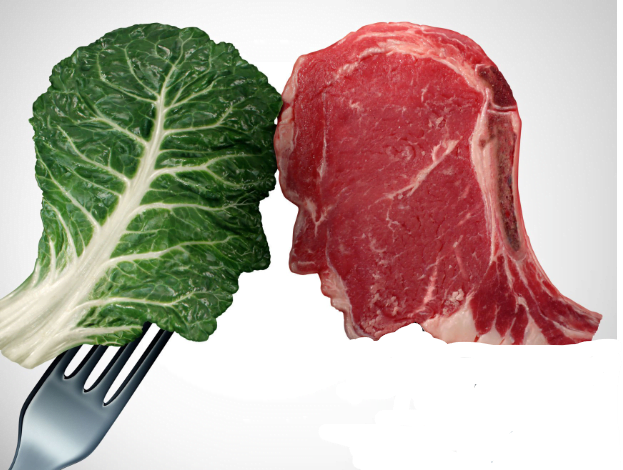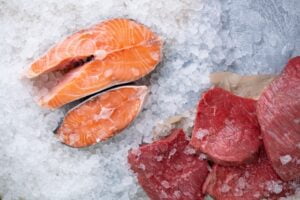The Ultimate Guide to the Carnivore Diet: Everything You Need to Know

Introduction to the Carnivore Diet
Are you ready to sink your teeth into a diet that’s all about meat, meat, and more meat? If so, welcome to the ultimate guide to the Carnivore Diet! Whether you’re a seasoned carnivore looking for new tips or a curious newbie eager to learn more, this comprehensive breakdown will satisfy your hunger for information on this unique way of eating. Let’s dig in!
The Science behind the Diet: Benefits and Risks

The Carnivore Diet is a dietary approach that primarily consists of animal products like meat, fish, and poultry. Proponents claim that this diet can lead to weight loss, improved mental clarity, and reduced inflammation due to the absence of carbohydrates.
On the flip side, critics raise concerns about potential risks associated with eating only animal-based foods. These risks may include nutrient deficiencies in essential vitamins and minerals found in plant foods such as fiber, antioxidants, and phytonutrients.
Research on the long-term effects of the Carnivore Diet is limited. While some individuals report feeling better on this diet, others may experience negative health outcomes over time if not carefully monitored for nutritional adequacy.
Before embarking on any new dietary regimen like the Carnivore Diet, it’s crucial to consult with a healthcare professional or registered dietitian to ensure you’re meeting your body’s needs for optimal health and well-being.
Also Reads: Well health tips
Foods to Eat and Avoid on a Carnivore Diet
When following a Carnivore Diet, focus on consuming animal-based foods such as beef, pork, poultry, fish, and other meats. These provide essential nutrients like protein and healthy fats that support overall health. Opt for fatty cuts of meat to fuel your body and keep you satiated.
Avoid all plant-based foods including fruits, vegetables, grains, legumes, nuts, seeds, and oils. The goal is to eliminate carbohydrates completely from your diet while prioritizing animal products for energy and nutrition. Stay away from processed meats as they often contain additives or sugars that go against the principles of the Carnivore Diet.
Include organ meats in your meal plan to get vital vitamins and minerals not found in muscle meat alone. Liver is particularly nutrient-dense and can help prevent nutrient deficiencies on this restrictive eating plan. Don’t forget to drink plenty of water to stay hydrated since you won’t be getting fluids from fruits or vegetables while on the Carnivore Diet.
Also Reads: diet-for-gastritis-of-the-stomach/
Success Stories and Research Studies
Success stories and research studies on the carnivore diet have been gaining attention in recent years. Many individuals have reported significant improvements in their health after adopting this meat-based eating plan. From weight loss to better mental clarity, these personal accounts are inspiring for those considering trying out the carnivore diet.
Research studies have also started to explore the potential benefits of a carnivorous eating pattern. While more long-term studies are needed, initial findings suggest that this diet may help reduce inflammation, improve metabolic health, and even aid in certain medical conditions. The scientific community is intrigued by the outcomes observed so far and continues to delve deeper into understanding how a carnivore diet affects our bodies at a physiological level.
These success stories and research studies provide valuable insights into the potential advantages of following a carnivore diet. As more people share their experiences and as further research is conducted, we can expect to learn even more about how this unique way of eating impacts our overall well-being.
Meal Planning and Recipes for a Carnivore Diet
When following a Carnivore Diet, meal planning is key to ensuring you get the right nutrients from animal-based foods. Start by incorporating a variety of meats such as beef, chicken, pork, and lamb into your meals. Experiment with different cuts and cooking methods to keep things interesting.
Consider adding organ meats like liver or kidney for a nutrient boost. Don’t forget about seafood options like salmon, shrimp, and sardines which are rich in omega-3 fatty acids. Incorporate eggs for added protein and versatility in recipes.
For meal ideas, try steak with butter-fried mushrooms or grilled chicken thighs with crispy skin. Simple yet flavorful dishes like bacon-wrapped scallops or beef kebabs can make carnivore eating enjoyable.
Meal prepping can also be helpful for busy days – cook large batches of meat ahead of time to have on hand throughout the week. Remember to listen to your body’s cues and adjust portions based on hunger levels.
How to Address Nutrient Deficiencies on a Carnivore Diet
While the carnivore diet can provide many benefits, it’s essential to be mindful of potential nutrient deficiencies that may arise from restricting food groups. Since this diet primarily focuses on animal-based foods, it’s crucial to ensure you’re getting a variety of nutrients.
One way to address potential deficiencies is by incorporating organ meats into your diet. Liver, for example, is rich in vitamins A and B12, which are commonly lacking in a carnivore diet.
Another strategy is to include seafood, such as salmon or sardines, which are excellent sources of omega-3 fatty acids and vitamin D. These nutrients are important for overall health and well-being.
Supplementation can also help fill any nutritional gaps. Consider adding vitamins like magnesium, potassium, and vitamin C to support optimal function while following a carnivore eating plan.
Regular blood work and consultations with a healthcare provider can help monitor your nutrient levels and make any necessary adjustments to prevent deficiencies while on the carnivore diet.
Alternatives and Modifications for Vegetarians and Vegans
For vegetarians and vegans interested in exploring a more animal-focused diet like the carnivore diet, there are some alternative approaches to consider. While traditional carnivore guidelines emphasize meat consumption, modifications can be made to align with plant-based preferences.
One option is the “modified carnivore” approach, which allows for limited inclusion of certain plant foods like low-carb vegetables or berries. This variation can help maintain essential nutrient intake while still following the principles of a predominantly animal-based diet.
Another alternative for vegetarians and vegans is incorporating more seafood into their meals. Fish and shellfish provide high-quality protein and essential Omega-3 fatty acids that are beneficial for overall health.
Finding a balance that works for individual dietary needs and preferences is key when considering alternatives to the strict carnivore diet. Experimenting with different variations can help personalize the approach while still reaping potential benefits associated with reduced carbohydrate intake.
Tips for Beginning a Carnivore Diet
Transitioning to a carnivore diet can be a significant change for your body, so it’s essential to start gradually. Begin by eliminating processed foods and sugars from your meals. This will help prepare your digestive system for the shift towards a meat-based diet.
Focus on incorporating a variety of meats like beef, poultry, pork, and fish into your meals. Experiment with different cuts and cooking methods to keep things interesting and enjoyable.
Stay hydrated throughout the day by drinking plenty of water to support digestion and overall health. Consider adding bone broth or electrolyte supplements if needed to maintain electrolyte balance during the initial stages of the diet.
Listen to your body as you transition – pay attention to how you feel physically and mentally. If you experience any adverse symptoms, consult with a healthcare professional before making any drastic changes.
Common Mis
Embarking on a carnivore diet comes with its fair share of misconceptions that can cloud your judgment. One common misconception is that you’ll miss out on essential nutrients by cutting out plant-based foods. However, with careful planning and supplementation, nutrient deficiencies can be mitigated.
Another myth is that the carnivore diet will lead to high cholesterol levels due to the consumption of animal fats. Contrary to popular belief, many individuals following this diet have reported improved lipid profiles and overall health markers.
There’s also a misconception that the carnivore diet is unsustainable in the long term. While it may not be suitable for everyone, many advocates have successfully followed this way of eating for extended periods without any adverse effects.
It’s crucial to separate fact from fiction when considering the carnivore diet and consult with a healthcare provider before making any drastic dietary changes. Stay informed and open-minded as you navigate through the sea of misinformation surrounding this controversial eating approach.
What can you eat in the carnivore diet?
When following the carnivore diet, your food choices are pretty straightforward – you stick to animal products only. That means indulging in delicious and nutrient-rich foods like beef, pork, lamb, chicken, fish, and other meats. You can also enjoy eggs and high-fat dairy products like butter and cheese.
For those looking for variety, organ meats such as liver or heart are also encouraged as they pack a powerful nutritional punch. Don’t forget about bone broth which is not only tasty but also great for gut health. And if you’re feeling adventurous, some carnivores even include insects in their diet!
While it may seem restrictive to some, many people find that the simplicity of the carnivore diet makes meal planning a breeze. Plus, with so many options within the animal kingdom to choose from, you’ll never get bored with your meals on this unique eating plan.
Is eating a carnivore diet healthy?
Many people wonder if eating a carnivore diet is healthy. Advocates of the diet claim that by consuming only animal products, individuals can experience improved digestion, weight loss, and increased energy levels. However, skeptics raise concerns about potential nutrient deficiencies and long-term health implications.
Proponents argue that the high protein content in meat can support muscle growth and repair, while the absence of carbs can lead to stable blood sugar levels. On the other hand, critics warn about missing out on essential vitamins, minerals, fiber, and antioxidants found in plant-based foods. They suggest that a balanced diet incorporating a variety of food groups may be more beneficial for overall health.
Whether or not a carnivore diet is deemed healthy depends on individual preferences, goals, and medical considerations. It’s essential to consult with a healthcare professional before making significant dietary changes to ensure optimal health outcomes.
Alos reads: https://techbiseblog.com/health/




